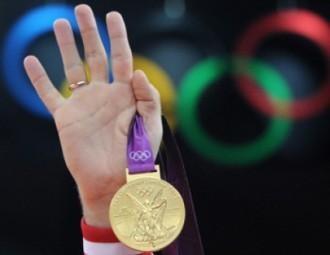Uladzimir Matskevich: All gold medals earn prestige for Belarus

Lack of clear ideological basis for unity of Belarusan nation affects both the sport and the fans.
Belarusan sportsmen are now having their time of triumph. Thus, Anton Kushnir, Belarusan freestyle skier won the final in freestyle qualification yesterday, on February 17. Darya Domracheva, the Belarusan biathlete, is now three times Olympic champion, as she has already won in the women's biathlon 10-kilometer pursuit, in the women's biathlon 15-kilometer individual and in the 15-kilometer individual race in Sochi. Belarusan Nadezhda Skardino won a bronze medal, and the same day Alla Tsuper won gold for Belarus in the women's aerials competition. Now Belarusan team has six medals altogether: five gold and one bronze. Our team occupies seventh place in a ranking by number of medals.
However, not only Belarusan beauties and champions are in the center of attention now. Governmental media have broadly advertised the celebration of the first gold medal in biathlon by Aliaksandr Lukashenka and his retinue. After that Internet is full of negative remarks towards Belarusan sportswomen.
Why does it happen so: sportsmen sacrifice their life to become champions, while others use their victories? Why Belarusan champions are not respected, but, vice versa, are badmouthed?
These paradoxes “EuroBelarus” Information Service discussed with Uladzimir Matskevich, the head of the Board of the International Consortium “EuroBelarus”.
- Even in Soviet Union sport and the achievements of Soviet sportsmen was a unifying factor: all citizens of the USSR were proud of their sportsmen’s achievements. In Belarus things are quite the opposite: the triumph of Belarusan Olympic contenders can lead to disregard and even insults. Is it that the contradictions within the society are that big?
- However sad it may sound, but the lack of clear ideological basis for unity of Belarusan nation affects the sport and is the reason for discord among the fans: someone calls for boycott of the 2014 Ice Hockey World Championship in Belarus, someone is against Olympic Games in Sochi. Such attitude is translated onto the Belarusan sportsmen, too.
In our time of information boom Pierre de Coubertin’s ideas of reconciling different nations seem utopian, as starting from the Olympic Games in Berlin authoritarian regimes have been using the Olympics for their own political goals. Thus, on the one hand, Olympic Games serve to unite nations and conflicting sides in one country, on the other hand they are the reason of even bigger confrontation and enmity.
- Thanks to the Belarusan team our country left Russia and China behind in a ranking by number of medals for some time. However, an evening spend in the company of Aliaksandr Lukashenka and Belarusian businessmen Yury Chyzh and Aliaksandr Shakutsin in Lukashenka’s residence in Sochi evoked negative reaction in society. Is it fair that Belarusan sportsmen are accused of “drinking tea with the dictator”? Or sports and politics don’t go together at all?
- It is unreasonable to demand clear political stance from sportsmen, who devote all their free time not to politics, literature and art but to everyday exercises, training sessions and competitions in order to achieve ultimate records.
Sport is not only the sportsman himself; it is also coaches, dieticians, specialists in equipment and many other things, which have to be financed. So regardless of the sportsmen’s will and beliefs their managers urge them to give their attention to their sponsors.
Whatever you might think about Darya Domracheva, she is a KGB major and got the military rank of KGB lieutenant colonel. And accordingly, president pro tempore heads the KGB. PR shouldn’t be mistaken for personal sportsman’s believes: he who pays the piper calls the tune.
Anyway, all gold medals earn prestige for Belarus. Apolitical fans do not always know where small countries are situated. And if a sportsman from such country wins an Olympic medal, fan got interested in this country, learning about the political prisoners and the dictatorship as well.
We have to understand and to accept that.
- Is it right to think that the achievements of the sportsmen result from the concern and support of the state and the President?
- Our world lies far from ideal; and politicians gain points at the expense of sportsmen’s achievements. It is the result of mass culture, which is supported by people, who buy mass culture products. So if you don’t want to see all sorts of politicians around sportsmen you’d better stop buying glossy magazines and yellow press.
- Lukashenka is already using the Olympic Games in Sochi for the 2015 presidential election campaign. The 2014 Ice Hockey World Championship in Minsk is likely to suffer the same fate. Will Belarusans believe in these tricks?
- Let us not be that naïve: if we compare the situation in Ukraine and in Belarus, there are less reasons for mass protests in our country: our standard of living is higher and order is somewhat provided. In this aspect dictatorship has an advantage over young democracy.
I wouldn’t say that Lukashenka doesn’t have any aces in the hole except sport. Political struggle is not built on principle “the worse the better”.
Let’s differentiate between the achievements of the sportsmen and pseudo-sporting fuss. Politicians will continually get use of sportsmen’s achievements until we mix personal achievements with the position of the state.
But anyway, Olympic medals enrich our country, though we can achieve more and haven’t realized our athletic potential to the full.
-
03.01
-
07.10
-
22.09
-
17.08
-
12.08
-
30.09



























